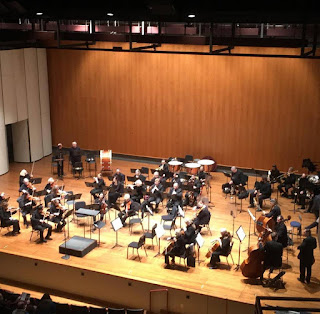The rest of you can prattle on about your basketball coaches while I yawn and fire up the gramophone -- because here's a genuinely important contract extension.
TEDDY ABRAMS SIGNS 5-YEAR CONTRACT
Louisville, KY (3.20.2019)… The Louisville Orchestra Board of Directors, together with CEO, Robert Massey, are pleased to announce an unprecedented 5-year contract to extend the term of Teddy Abrams as Music Director. This extension from the usual 3-year contract renewal shows the organization’s confidence in the artistic direction and creative vision of the young conductor.
“We’re thrilled to make this extraordinary commitment to engaging Teddy until the 2024-2025 Season. His vision for the renaissance of the arts for our orchestra and our community is unique in the world,“ says John P. Malloy, President of the LO Board of Directors.
Abrams was named Music Director of the Louisville Orchestra in 2014, the youngest conductor ever named to that position with a major orchestra. He’s become a popular figure throughout Louisville while developing a national reputation for innovation and community building.
Since stepping onto the Louisville Orchestra podium, Abrams has built an impressive list of accomplishments including the release of “All In,” the LO’s first album in nearly 30 years, which reached #1 on the Classical Billboard chart. He has re-invigorated the orchestra’s historic leadership in commissioning new works and presenting world premieres. His own award-winning compositions have brought a diverse new audience to the Louisville Orchestra including The Greatest: Muhammad Ali, Unified Field, Kentucky Royal Fanfare (which was performed for Charles, Prince of Wales) and others. One of his first priorities was establishing a new concert series that took the orchestra into Louisville neighborhoods for performances in the Music Without Borders Series to expand the orchestra’s community impact. He also launched a 2-concert “Festival of American Music,” a musical challenge to audiences to expand the definition of concert music through an exploration of the American influences on the music of all genres.
Artistic collaboration has become a focus for Abrams’s work. Several of his most notable collaborators have been indie-rocker Jim James, Grammy-Award winning fiddler Michael Cleveland, folk singer-songwriter Will “Bonnie Prince Billy” Oldham, choreographers Adam Hoagland and Andrea Schermoly, filmmakers Dennis Scholl and Owsley Brown III, and many more. Abrams’s efforts to bring the Louisville arts community into collaborative projects have resulted in exceptional performances featuring individuals and local organizations including Louisville Ballet, University of Louisville musicians from the choral and jazz programs, artists from the Kentucky College of Art and Design, independent local artists such as rapper Jecorey “1200” Arthur, folk fiddler Scott Moore, folk cellist Ben Sollee, jazz singer Carly Johnson and others.
A passionate advocate for music education and mentoring, Abrams regularly conducts in-school masterclasses at middle and high schools, launched a select program to personally support serious high school students in their music pursuits, revitalized the Louisville Orchestra’s 78-year-old MakingMUSIC program of education concerts for elementary school children, crafted a recycling-creativity project for youngsters to make musical instruments from “trash” known as “Landfill Orchestra,” and is currently working with the Detroit-based Sphinx Organization (dedicated to transforming lives through the power of diversity in the arts) to mentor two talented young conductors.
In addition to his activities as Music Director for the Louisville Orchestra, Abrams is Music Director for the Britt Festival, a summer concert series based in Jacksonville, Oregon. He is in demand as a guest conductor and has appeared with the Los Angeles Philharmonic, the San Francisco Symphony, the National Orchestra, and the orchestras in Houston, Milwaukee, Vancouver, Colorado, Phoenix and the Saint Paul Chamber Orchestra. He served as assistant conductor of the Detroit Symphony from 2012 to 2014. From 2008 to 2011, Abrams was the Conducting Fellow and Assistant Conductor of the New World Symphony in Miami Beach, serving under his long-time mentor Michael Tilson Thomas.
An accomplished pianist and clarinetist, Abrams has appeared as soloist in Louisville and across the country. He also collaborates with a wide variety of musicians as keyboardist for both classical, indie-rock and pop concerts. He has held residencies at the La Mortella music festival in Ischia, Italy, and at the American Academy in Berlin. Abrams is a proud alumnus of the San Francisco Symphony Youth Orchestra and graduated from the San Francisco Conservatory of Music with a bachelor of music degree, having studied piano with Paul Hersh.





















